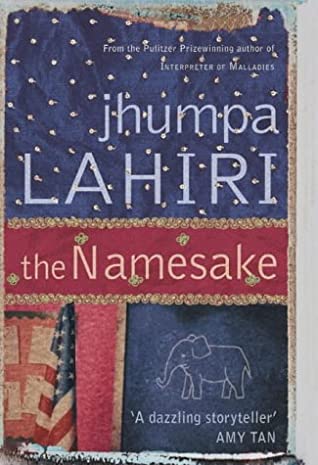

 |

|

The average rating for The namesake based on 2 reviews is 5 stars.
Review # 1 was written on 2007-07-08 00:00:00 Ira Belfer Ira BelferAfter finishing the Namesake, my thoughts were drawn to my last roommate in college, an Indian woman studying for her PHD in Psychology. When I first moved in, she had just broken up with her white boyfriend. “It never would have worked out anyway…” she had cried. By the end of that same year she was flying of to Houston to be wed to a man she had only seen once, a marriage arranged by their parents. Many nights my other roommate (an exchange student from Berlin) and I would sit out on the balcony smoking cigarettes and marveling at the concept of an arranged marriage in the new millennium. This book made me understand her a little bit better, her choice in marriage and other aspects of our briefly shared lives, like: her putting palm oil in her hair, the massive Dutch oven that was constantly blowing steam, or her mother living with us for 3 months. This is after all the story of an Indian growing up American and the cultural adaptations and clashes that color his life. Perspective shifting from parent to child and back again, it’s an engaging view of an immigrant family in America. Gogol hates his name, and the Bengali traditions that are forced on him since childhood. The reader follows him through adolescence into adulthood where his history and his family affect his relationships with women more than anything else. As much as this book was heralded for its exploration of the immigrant experience, as any truly great piece of literature, its lessons are universal... Anyone who has ever been ashamed of their parents, felt the guilty pull of duty, questioned their own identity, or fallen in love, will identify with these intermingling lives. The pace in which she tells it is exactly equal to looking back on the memories of a life lived. Skimming over the mundane, she punctuates the cherished memories and life changing events that are now somewhat hazy. It is a superb first novel. |
Review # 2 was written on 2017-02-07 00:00:00 david penalosa david penalosaIn 2000, Jhumpa Lahiri won the Pulitzer Prize for her story collection Interpreter of Maladies, becoming the first Indian to win the award. In the last story, an engineering graduate student arrives in Cambridge from Calcutta, starting a life in a new country. This story is the basis for The Namesake, Lahiri's first full length novel where she weaves together elements from her own life to paint a picture of the Indian immigrant experience in the United States. Ashoke and Ashmina Ganguli, recently wed in an arranged marriage, have immigrated to Boston from Calcutta so that Ashoke can pursue a PhD in engineering. A world away from their Bengali family and friends and in the days before the Internet, their only means of communication was aero grams. Ashmina is immediately homesick for India so she founds a network of Bengalis up and down the east coast, preserving traditions and creating a pseudo-family in her new country. With her husband learning and teaching, these friends are a reminder of home for her, and, as a result, she never fully assimilates into American society. Within the first year of the Gangulis arrival, Ashmina becomes pregnant with the couple's first child. Adhering to Bengali tradition, Ashmina's grandmother is supposed to name the baby, but her letter never arrives. Ashoke contemplates and comes up with the only name he can think of: Gogol, after the Russian writer, whose volume of short stories saved his life during a fatal train derailment in India. Both Ashoke and Ashmina desire that Gogol have a Bengali life in America despite being one of few Indian families in their area. Gogol and his younger sister Sonali grow up fully assimilated as Americans. They barely speak Bengali and only once in awhile crave Indian food. Both choose career paths that are not traditionally Indian so that they have little contact with the Bengali culture that their parents fought so hard to preserve. Lahiri even creates a character based on her own immigrant experiences who desires an identity different than Bengali or American and seeks a doctorate in French literature. Based in Brooklyn and Paris, this woman resembles Lahiri as she learned to speak Italian and lived in Rome for a number of years. Lahiri and her character sought to remake themselves in order to distance themselves from the Bengali culture that their parents forced upon them as children. As in Interpreter of Maladies, Jhumpa Lahiri paints a rich picture of the Indian immigrant experience in the United States. Using short sentences with rich prose, the story moves quickly as we follow the Ganguli family for thirty five years of their lives. Being an immigrant turns into a unique experience for each character, yet the story centers around Gogol as he moves from Indian American child to American Indian adult. With a novel rich in subplots and provocative issues of the day, Jhumpa Lahiri is quickly becoming a leading voice in literary fiction and a favorite author of mine. I look forward to the other rich novels that Lahiri has in store, and rate The Namesake 4.5 bright stars. |
CAN'T FIND WHAT YOU'RE LOOKING FOR? CLICK HERE!!!